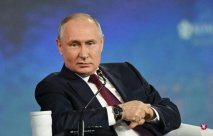
(Bloomberg, Washington) The Federal Reserve pointed out that after the failure of more banks in March this year, the tightening of the US credit environment may put pressure on economic growth, and the degree of further tightening monetary policy will depend on the next release.Brokers data.
The Federal Reserve said in a semi -annual report released to Congress on Friday (June 16) that to return the inflation rate to 2%, economic growth may need to be lower than the trend level within a period of time, and the labor market environment needs to needWeaken to a certain extent.
The report said: "Evidence shows that the pressure of recent banking industry, as well as related concerns about deposit outflow and financing costs, prompting some banks to tighten or expected to tighten loan standards and clauses ...Industry, such as commercial real estate and small enterprises, may have a greater degree of credit tightening. "
The Federal Reserve was suspended on Wednesday (14th) for 15 months, and the interest rate of federal funds was maintained at 5%to 5.25%.However, decision makers expect to raise interest rates twice this year to deal with high inflation rates and strong labor markets.
The Federal Reserve Director Voller said on Friday that the overall inflation has been "halved" since seeing the top last year, but the core inflation of food and energy has almost no change in the past eight or nine months.To reduce price pressure. "
At another event on Friday, Balkin, President of the Federal Reserve Bank, said that inflation is still "too high and stubborn."
He reiterated that the Fed's goal is to reduce the inflation rate to 2%. If the data released next failed to show that the inflation fell quickly, the Fed will take more action.He warned that premature relaxation of monetary policy would be a high price.
According to the consumer price index released a few days ago, the overall inflation has slowed down, but core inflation continues to increase at the speed of the Fed.Recent data also shows that employers continue to increase recruitment rapidly in May, and job vacancies have risen in April.
President of the International Monetary Fund: Europe must be carefully adjusted to monetary policy
In addition to the United States, the European economy on the other side of the Atlantic Ocean is also finding a strategy to find out.Georkeva, president of the International Monetary Fund (IMF), said on Friday that the European Central Bank must carefully adjust the monetary policy and avoid hard landing in the European economy, but should also continue to focus on reducing inflation.
She said in an interview with Bloomberg TV that it is possible to avoid hard landing. "But indeed, this road is narrow."She pointed out that the problem in Europe is that economic growth has slowed down, but inflation has not dropped rapidly, so the focus is on low inflation.
On the day before Georkeva's speech, the European Central Bank announced that it raised interest rate hikes 25 basis points and warned that it might raise interest rates again in July.
Georgieva pointed out that the European Central Bank's interest rate hikes began to be later than the Federal Reserve, and the situation in Europe is a little different from the United States. Energy prices have a greater impact on the European continent.
She said that the Fed's actions showed that the economy softened. In contrast, European restaurants were full of people and people were working.
She also pointed out that 90 % of the economic growth rate in developed economies is slowing.



